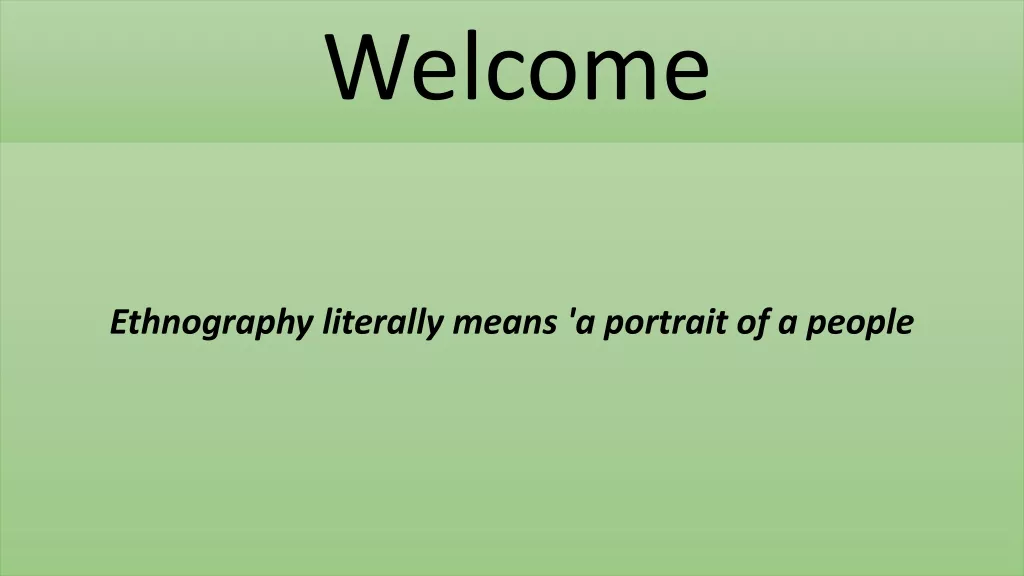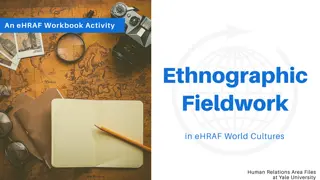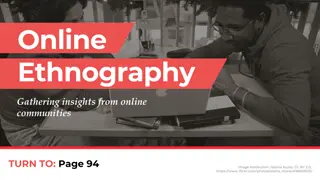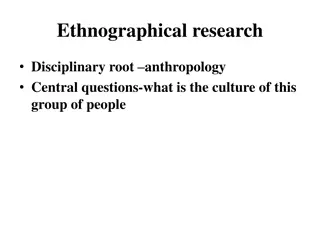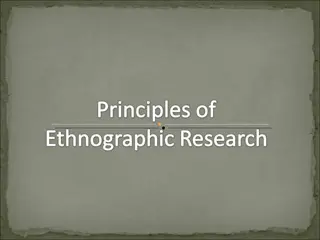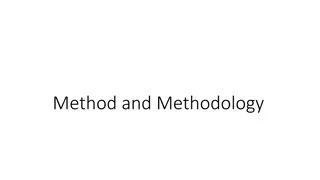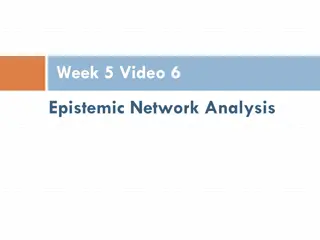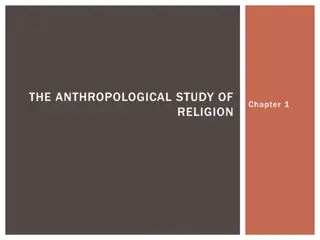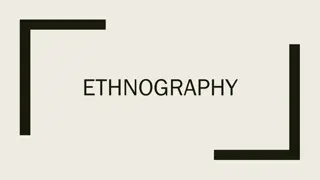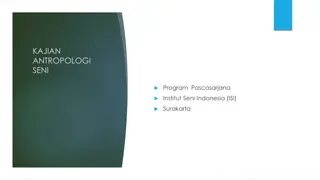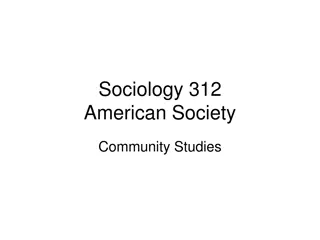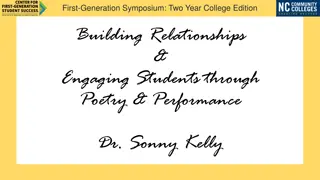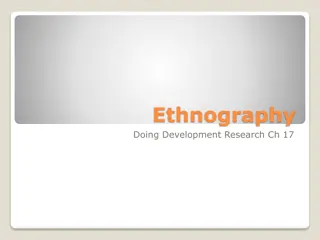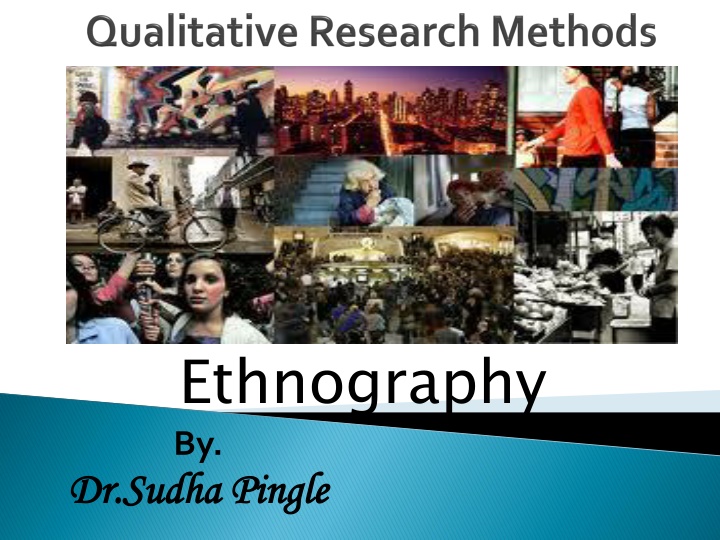
Ethnography: A Deep Dive into Cultural Exploration
Dive into the world of ethnography with insights on studying cultural and social groups, observing human interactions, and the development of this field by notable anthropologists like Franz Boas and Bronislaw Malinowski. Explore the essence of culture, rituals, and language through the lens of ethnography as it shapes education and our understanding of humanity.
Download Presentation

Please find below an Image/Link to download the presentation.
The content on the website is provided AS IS for your information and personal use only. It may not be sold, licensed, or shared on other websites without obtaining consent from the author. If you encounter any issues during the download, it is possible that the publisher has removed the file from their server.
You are allowed to download the files provided on this website for personal or commercial use, subject to the condition that they are used lawfully. All files are the property of their respective owners.
The content on the website is provided AS IS for your information and personal use only. It may not be sold, licensed, or shared on other websites without obtaining consent from the author.
E N D
Presentation Transcript
Ethnography By. Dr.Sudha Pingle Dr.Sudha Pingle
Ethno: people or folk; Graphy: describe something Ethnography: describing and understanding another way of life from the native point of view
Ethnography is the study of an intact cultural or social group(or an individual or individuals within group) based primarily on observations and a prolonged period of time spent by the researcher in the field.
a method of observing human interactions in social settings and activities (Burke & Kirk, 2001) as the observation of people in their cultural context the study and systematic recording of human cultures
Culture includes language, rituals, economic and political structures, life stages, interactions and communication styles. An ethnographer is interested in examining their shared patterns of behaviour, beliefs, and language.
Ethnography was developed in the field of Anthropology in the late 19th and early 20th Centuries, most notably by Franz Boas in the USA and Bronislaw Malinowski in the UK. The aim is to study societies in a holistic manner and places importance on the role of researcher as a participant observer
Bronislaw Malinowski in 1915 Spent three years on the Trobriand Islands (New Guinea) Invented the modern form of fieldwork and ethnography as its analytic component
Ethnography as practiced in education has been shaped by cultural anthropology. This infant interdisciplinary area began to crystallize during the 1950 and continued to develop through 1980 (LeCompte,1993)
Margaret Mead, a well known anthropologist, studied child rearing, adolescence, and the influence of culture on personality in Samoa. Jules Henry depicted elementary school classroom and high schools as tribes with rituals, cultures and social structures. George and Louis Spindler Examined educational decision making, curriculum content and teaching.
An Ethnography focuses on an entire cultural group, this cultural group may be small such as a few teachers, a few social workers. But typically it is large involving many people who interact overtime teachers in an entire school, a community social work group. Here the researcher describes and interprets the shared and learned pattern of values, behaviour, beliefs, and language of a culture-sharing group (Harris, 1968)
Educational anthropologist focused on subculture groups such as Career and life histories or role analyses of individuals. Studies of school facilities or school districts that approach these units as discrete communities. Microethnographies of small work and leisure groups within classroom or schools. Studies of single classroom abstracted as small societies. In studies such as this educational ethnographer developed and refined by procedures borrowed from anthropology and sociology.
When the study of a group provides understanding of larger issues We have a culture sharing group to study- that has been together for some time and has developed shared values, belief and languages. The cultural-sharing group may be narrowly framed e.g. teachers, students or staff members or broadly framed e.g. entire school and their success, innovation or violence. When we have long term access to cultural-sharing group
To define a problem when the problem is not clear To define a problem that is complex and embedded in multiple systems or sectors/cultures To identify participants when the participants, sectors, or stakeholders are not yet known or identified To clarify the range of settings where the problem or situation occurs at times when the settings are not fully identified, known, or understood To explore the factors associated with the problem in order to understand it
To describe and explain a facet or segment of group social life as it relates to education It begin as a broad statement about the purpose of the research, then are allowed to emerge more specifically as data are amassed.
Step 1: Preparation Step 2: Selecting Cultural themes or Issues to study about the group Step 3: Field Study Step 4: Analysis Step 5: Reporting
Determine if ethnography is the most appropriate design to use to study the research problem. Ethnography is appropriate if the needs are to describe how a cultural group works and to explore the beliefs, language, behaviour, and issues such as power, resistance, and dominance. Familiarize yourself with Cultural, Organization policies, Work culture, Current System & its history Identify the Focus of the Study and locate a culture-sharing group to study Gain access and permission and Identify the Gate-keepers
This involves the analysis of the culture-sharing group. Themes Themes may include enculturation, socialization, learning, cognition, domination, inequality, or child and adult development. Culture is inferred from the words and actions of the members of the group, and it is assigned to this group by the researcher. It consist of what people do (behaviour), what they say(language), the potential tension between what they do and ought to do.
Fetterman (1998) discusses how ethnographers describes a holistic perspective of the group's history, religion, politics, economy, and group's history, religion, politics, economy, and environment. environment. Within this description, Cultural concepts Cultural concepts such as the social structures, kinship, the political structure, and the social relations structures, kinship, the political structure, and the social relations or function or function among members of the group may be described. The cultural concepts determine which type of ethnography to use. Realist ethnography or Critical ethnography Realist ethnography or Critical ethnography social
Negotiating entry the Gatekeeper, Key Actors, Key Informants The researcher observes the group or society Privileged observer just observes Participant observer functions as part of the group Establish rapport with people in the community ,society or organization Researcher watches and listens attentively and records as much detail as possible (this is called naturalistic observation).
Record everything: Their visits, observations, impressions, feelings, hunches, emerging question Follows any lead, Large amounts of notes are typically generated. Field notes, audio, or video recording, although there is a long ethnographic tradition of using photographs and film This process may last a week or two or could be years.
Data is usually recorded in what are referred to as field notes, The focus on everyday life and people in their natural setting Ethnography places an emphasis on the perspective of those being studied verbal descriptions of people, interactions, settings, objects and verbal descriptions of people, interactions, settings, objects and phenomena within the context being studies phenomena within the context being studies Data Collection done by the researcher through observation, sometimes combined with interview Types of knowledge Types of knowledge Emic local knowledge: how people think, perceive, categorize the world; what has meaning in their world-the natives point of view Etic -- shift focus from the native's point of view to that of the anthropologist
The researcher analyzes the notes, identifies themes, looks for answers to research questions, and makes logical inferences. Data treatment and analysis Data treatment and analysis presentation of verbal descriptions and/or logical analysis of information to discover salient patterns and themes Compile data into databases: Compile data into databases: Numerical Textual Multimedia Quantify data and compile statistics. Reduce and Interpret Data. Review and Redevelop Ideas.
The final step is to write the research paper describing the process, observations, findings, and conclusion. Often rich descriptions are provided so the readers can make their own interpretations. Consider multiple audiences and respective goals. Prepare a report and present the findings.
In-Depth understanding of a culture amongst a group of people (detailed and more likely valid interpretations) Gives a voice to a culture to express their views, which might not otherwise be heard Influential in creating an understanding among outsiders Also may reveal embedded cultural values that were not obvious to the group Looks at the situation holistically May arrive at greater understanding of the problem than other research processes
Cumbersome and Time-consuming, and can be expensive Possibility that researcher is changing the natural way a culture behaves by being present Inappropriate for analyzing complex environmental problems whose cause-effect relationships are external to the place and time of study (e.g., climate change) Not really able to generalize findings Possible bias on the part of the observer (which leads to validity concerns) Generalizability (how generalizable are the findings from a small, purposely selected group)
Reaction of different stakeholders towards paper leak and re-examination in Mumbai University. Understanding Inclusive Culture in School Stakeholders Resistance towards Inclusive Education. 1. 2. 3.

